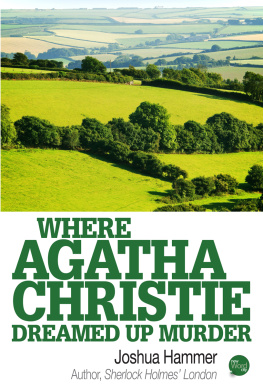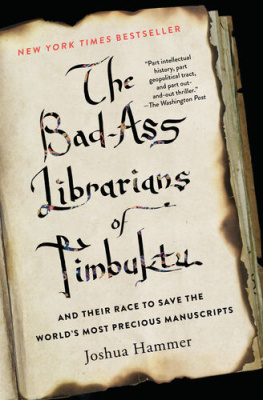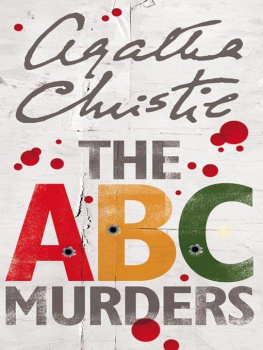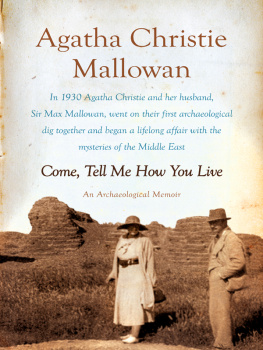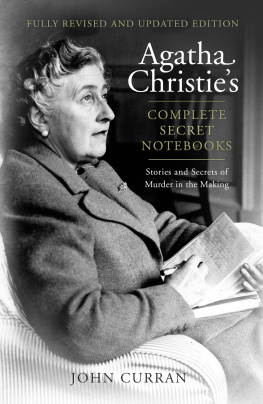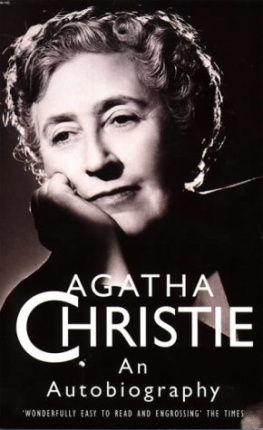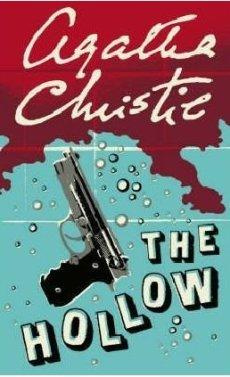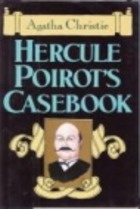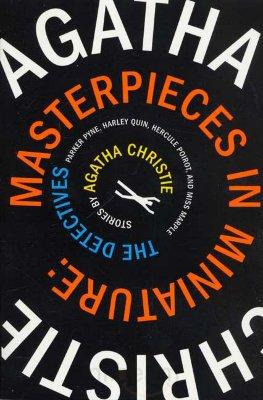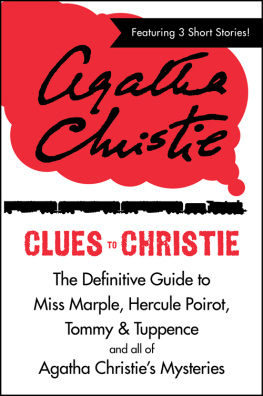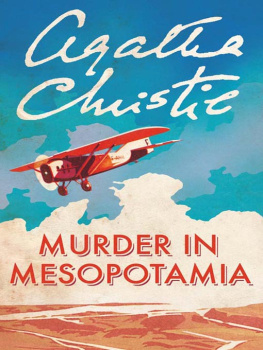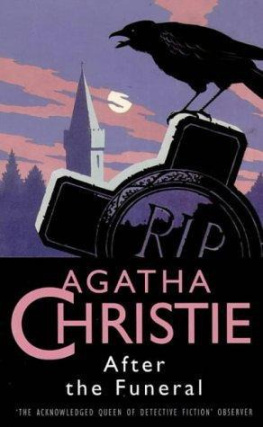WHERE AGATHA CHRISTIE DREAMED UP MURDER
On a crisp winter morning in Devon, England, sunlight streams through the floor-to-ceiling French windows of the manor house called Greenway, the secluded estate where Agatha Christie spent nearly every summer from 1938 until her death in 1976. Gazing beyond a verdant lawn through bare branches of magnolia and sweet-chestnut trees, I glimpse the River Dart, glinting silver as it courses past the rolling hills. Robyn Brown, the houses manager, leads me into the library. Christies reading chair sits by the window; a butlers tray holds bottles of spirits; and a frieze depicting World War II battle scenes - incongruous in this tranquil country retreat - embellishes the cream-colored walls. It was painted in 1944 by Lieutenant Marshall Lee, a U.S. Coast Guard war artist billeted here with dozens of other soldiers after the British Admiralty requisitioned the house. The Admiralty came back after the war and said, Sorry about the frieze in the library. Well get rid of it, Brown tells me. Agatha said, No, its a piece of history. You can keep it, but please get rid of the [14] latrines.
Agatha Christie was 48 years old in 1938, gaining fame and fortune from her prolific output of short stories and novels, one series starring the dandified Belgian detective Hercule Poirot, another centered on the underestimated spinster-sleuth Jane Marple. Christies life had settled into a comfortable routine: Part of the year was spent at her house in Wallingford, near Oxford, and part on excavations in the deserts of Iraq and Syria with her second husband, archaeologist Max Mallowan. But Christie longed for a vacation refuge. That summer, she heard of a handsome Georgian manor house, built around 1792, going up for sale. It was set on 33 acres, 15 miles from her birthplace, the village of Torquay. For Christie, Greenway - reachable only by boat or down a narrow country lane one and a half miles from the nearest village of Galmpton - represented, as she wrote in her autobiography, the ideal house, a dream house. The estates owner, financially strapped by the Great Depression, offered it for just 6,000 - the equivalent of about $200,000 today. Christie snapped it up.
Here, the author and playwright could escape from her growing celebrity and enjoy the company of friends and family: her only child, Rosalind Hicks; son-in-law Anthony Hicks; and grandson Mathew Prichard, whose father, Rosalinds first husband, Hubert Prichard, had been killed in the 1944 Allied invasion of France. Greenway served as the inspiration for several scenes in Christies murder mysteries, including the Poirot novels Five Little Pigs (1942) and Dead Mans Folly (1956).
After Christie died, at age 85, the estate passed to Hicks and her husband. Shortly before their own deaths in 2004 and 2005, respectively, the couple donated the property to Britains National Trust, the foundation that grants protected status to historic houses, gardens, and ancient monuments and opens the properties to the public.
Brown recalls several meetings with the frail but alert 85-year-old Rosalind, whose failing health required her to move around the house on an electric scooter. At one of them, Brown broached the subject of Greenways future. The sticking point for Rosalind was that she didnt want us to create a tacky enterprise - the Agatha Christie Experience, Brown told me. Indeed, Hicks first demanded that the house be stripped bare before she would donate it. If we show the rooms empty, the house will have no soul, Brown recalled telling Rosalind. If we bring things in from outside, it will be contrived. Brown proposed that the house be left as though you and Anthony just walked out the door. Eventually, Rosalind agreed.
In 2009, after a two-year, $8.6 million renovation - the house was in terrible shape, Brown told me - Greenway opened to the public. During the first season, it attracted 99,000 visitors, an average of 500 a day, nearly double expectations, and its even more popular today.
Greenway offers an opportunity to view the intimate world of a reclusive literary master, who rarely gave interviews and shunned public appearances. She was hugely shy, and this was her place of solitude, comfort, and quiet, Brown told me. Greenway represents the informal, private side of Agatha Christie, and we have striven to retain that atmosphere.
Greenways success is the latest, most visible sign of the extraordinary hold that Agatha Christie continues to exert nearly 35 years after her death. Her 80 detective novels and 18 short-story collections, plus the romances written under the pseudonym Mary Westmacott, have sold 2 billion copies in more than 50 languages - making her by far the most popular novelist of all time. Her books sell 4 million copies annually and earn millions of dollars a year for Agatha Christie Limited, a private company of which 36 percent is owned by Mathew Prichard and his three children, and for Chorion Limited, the media company that bought a majority stake in 1998. A stream of dramatized Poirot and Miss Marple whodunits continue to appear as televised series.
Every year, tens of thousands of Christies admirers descend on Torquay, the Devon resort where the author spent her early years. They walk the seafront Agatha Christie Mile (A Writers Formative Venue,) that delineates landmarks of her life, from the Victorian pier, where the teenage Agatha roller-skated on summer weekends, to the Grand Hotel, where she spent her wedding night with her first husband, Royal Flying Corps aviator Archie Christie, on Christmas Eve 1914. The annual Christie Festival at Torquay draws thousands of devotees, who attend murder-mystery dinners, crime-writing workshops, and movie screenings and have been known to dress as Hercule Poirot look-alikes.
Agatha Mary Clarissa Miller was born on September 15, 1890, at Ashfield, her parents villa on Barton Hill Road in a hillside neighborhood of Torquay. Her father, Frederick Miller, was the charmingly indolent scion of a wealthy New York family; because his stepmother was British, he grew up on both sides of the Atlantic. Miller spent his days playing whist at Torquays Gentlemens Club and taking part in amateur theatricals. Her mother, Clara Boehmer, instilled in Agatha, the youngest of three children, a love of reading and an active imagination. I had a very happy childhood, Christie wrote in her autobiography, which she began in 1950 and completed 15 years later. I had a home and garden that I loved; a wise and patient Nanny; as father and mother two people who loved each other dearly and made a success of their marriage and of parenthood. Christies idyll disintegrated in the late 1890s, however, when her father squandered his inheritance through a series of bad business deals. He died of pneumonia at age 55 when Agatha was 11. From that point, the family scraped by with a puny income that Clara received from the law firm of her late father-in-law.
Agatha grew into an attractive, self-confident young woman, the belle of Torquays social scene. She fended off a dozen suitors, including a young airman, Amyas Boston, who would return to Torquay 40 years later, as a top commander in the Royal Air Force. He sent a note to Christie at Greenway requesting a meeting for old times sake, John Risdon, a Torquay historian and Christie expert, told me. And he got a reply back saying no thanks, she would rather have him cherish the memory of me as a lovely girl at a moonlight picnic... on the last night of your leave. She had, said Risdon, a thread of romanticism that went right through her life. In 1912 she met Archie Christie, an officer in the Royal Flying Corps, at a Torquay dance. They married two years later, and Archie went off to France to fight in the Great War. During his absence, Agatha cared for injured soldiers at Torquays hospital, then - in a move that would prove fateful - she distributed medicinal compounds at a local dispensary. Thats when she became fascinated by poisons.

